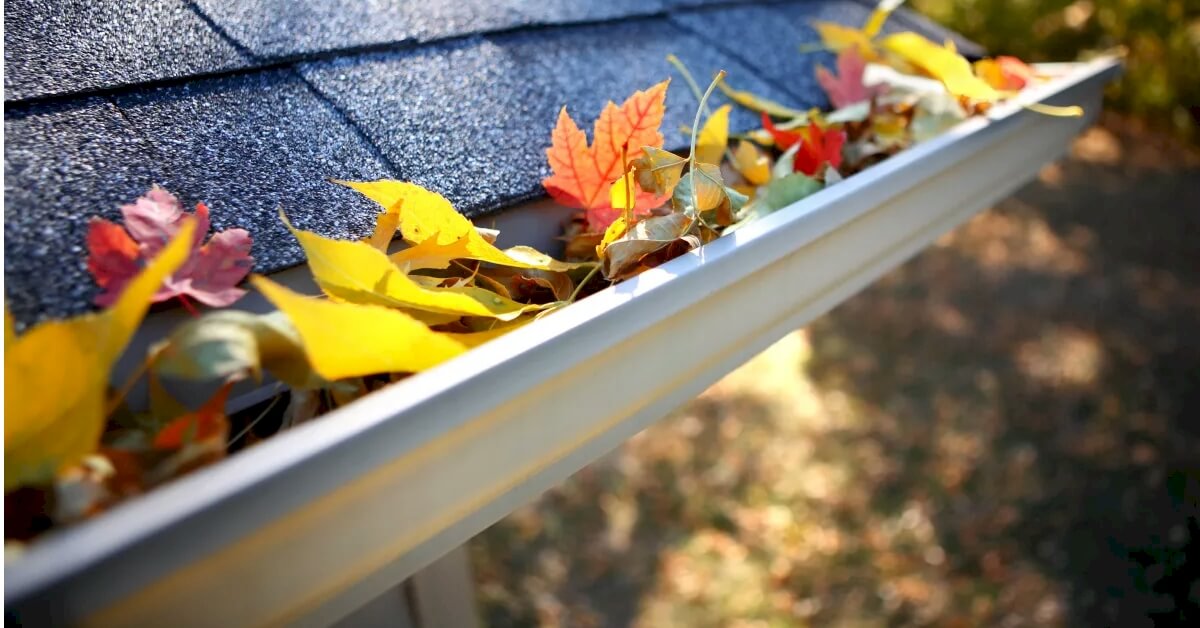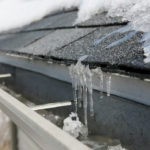
Why Do Gutters Overflow?
To safeguard your home from rainwater, it’s crucial to have a gutter system in place. This system serves as a pathway for rainwater to safely drain away from your house, preventing any damage to your roof, basement, and foundation caused by water leaks.
You need to keep your gutter system in good condition to work properly. Cleaning your gutters regularly is fundamental to maintaining their performance and extending lifespan. Cleaning gutters helps prevent debris and leaves from building up inside the system and blocking water flow.
In most cases, clogging is the chief culprit for overflowing gutters. However, there are various other reasons why gutters overflow, which we’ll discuss below.
Excess Rainwater
A heavy downpour can sometimes push debris and leaves into the gutters, clogging them. Eventually, gutters may sag under the weight of excess rainwater. This is the number one reason why gutter systems overflow.
While you have no control over how much rainwater a storm brings, investing in quality gutters is a great way to prevent your gutters from overflowing. This is especially important if you live in an area with plenty of rainfall. Additionally, installing splash guards on a steep roof can help prevent gutter overflow during storms.
Too Few Downspouts and Gutters
If you’ve not installed enough gutters, the rainwater might overflow. Not having enough gutters and downspouts can overwork the existing ones, potentially damaging them. Faulty downspouts and gutters can begin to leak, damaging your home’s foundation since rainwater can leak through.
If your area receives a lot of rainfall, install several gutters on all sides of your house or business premises. This will help to evenly distribute the rainwater so it doesn’t damage the gutters or overflow. Adding extra downspouts also helps make your gutter system more efficient.
You could also install wider gutters and downspouts and see what happens!
Clogged Gutters
A gutter blockage is also one of the most common causes of gutter overflow. Anything from nails to twigs, leaves, and other debris can cause a blockage. Your gutter guard could be another possible cause of a backup because it’s not letting water flow through effortlessly.

Remember that aged gutters might not work as efficiently as before or will have gradually moved out of position. This could make them easily overflow. If your gutters have moved from their correct position over time, hire a professional roofer to assess them and fix the issue.
Clogged Downspouts and Underground Drains
If your underground drains or downspouts are wholly or partially blocked, that could cause your gutters to overflow. Clogged underground drains and downspouts mean rainwater gets stuck in the downspouts. If your gutters don’t have proper covers, that could also clog your underground drains.
Dirty Gutter Guards
Many homeowners mistakenly assume they’ll never have to clean their gutters again after installing gutter guards. They couldn’t be more wrong! Gutter guards are designed to reduce the burden of gutter maintenance, not replace it.
Over time, debris can build up atop your gutter guards or on your roof, which may cause water overflow. To fix this problem, clean your gutter system at least once annually to sort out debris buildup.
Too Narrow Gutters
If your gutters are too small for your roof size, they’ll fill up too fast and overflow during downpours. Older homes typically have 5-inch gutters that work okay in areas with less rainfall or smaller roofs. In any other situation, 6-inch gutters may be the better choice.
Of course, 6-inch gutters are more expansive than their 5-inch counterparts–so they can catch fast-flowing water better. In addition, they can hold an extra 40% of water than 5-inch gutters.
If your gutters run over even when they’re debris-free, you should invest in larger ones. Similarly, if your home has large roof valleys, you may need 6-inch gutters.
Improperly Pitched and Tilted Gutters
Gutter pitch means the angle at which a gutter sits to ensure rainwater flows smoothly toward the downspout. If you’ve not had your gutters pitched properly, the water won’t flow correctly and could potentially get stuck in the gutters. This may cause several problems, including leaks, overflows, and even sagging gutters.
Loose Gutters

If your gutter system pulls away from the fascia, it can sag forward and cause water to overflow. Several factors, including insufficient brackets, loose brackets, or old fascia or gutter systems, cause loose gutters. Depending on what has caused the problem, you can either replace the fascia or gutter or tighten the brackets.
Maintenance Tips to Prevent Gutter Overflow
Gutter overflow is a common problem many homeowners must sort out every rainy season. If you’re experiencing this problem, fear not. These most common fixes are simple enough to do on your own.
Clear gutters every fall and spring: You should clean your gutters after the leaves have dropped in the fall and again during the spring just before heavy rains start.
Invest in gutter guards: Buying gutter guards can help you protect your gutters from debris. But ensure your gutter guards don’t cause an overflow by preventing rainwater collection.
Prevent ice dams: A buildup of ice in your gutters can make them sag and shift out of position, resulting in an overflow.
Get a gutter helmet: Invest in a gutter helmet to prevent gutter guard overflow problems. This cap is a great solution that can also help prevent ice dams during the winter.
Add more gutters: If you have multiple roof areas, it’s a good idea to add more gutters. Doing so will ensure your gutter system is better equipped to channel the excess rainwater away from your roof.
Are Your Gutters Overflowing?
Overflowing gutters may cause severe damage to your home’s roof, walls, and foundation. By learning why gutters run over and taking proper measures to sort out the problem, you can protect your home from water damage.
To fix issues in your gutter system, hire a reputable and experienced roofing contractor. Ensure they have an excellent workmanship track record, which will help extend the lifespan of your roof, foundation, and home.



